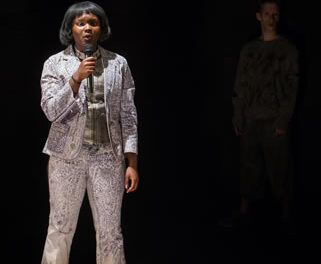The Little Green Pig Theatrical Concern, working in Manbites Dog Theater, has opened a stunning production of The Island, Athol Fugard’s 1973 play set in South Africa’s dreaded Robben Island Prison. With two characters and engrossing language rich in allusion, Fugard puts moral issues older than Sophocles into the context of Apartheid. To what law does one owe highest allegiance? When does morality demand conflict with the State? Can one be loyal to one’s country and defy the State? Can the individual survive the corruption of the State?
These questions and many more are embedded in Fugard’s deeply literary play — as they are in Antigone, Sophocles’ evergreen dramatic fifth century B.C. consideration of the vying demands of Family, State, and the Gods. Fugard uses Antigone — in which the heroine dies for defying the king and burying her brother, who had fought against the State — within his own play to draw parallels with South Africa under Apartheid, when thousands were imprisoned and murdered for insisting on living by a higher moral law than that of the racist State. This production of The Island marks actor Michael O’Foghludha’s directorial debut, and he brings to it his honed thinking on law and justice — in his day job, he is an attorney — as well as an acute sense of dramatic rhythm and timing.
Working with actors Thaddeus Edwards (John) and LaMark Wright (Winston), O’Foghludha has created a resoundingly physical production from two men talking in a very confined space. But the greater laurels go to the actors. As the audience files in, we see them engaged in surviving a Sisyphean torture. For 20 minutes, they mime their grueling task: breaking up rock, filling a barrow, dumping it in the spot recently emptied by the other. Over and over and over, they move through this dance of misery, grunting and sweating. By the time the whistle blows to release them and the lights come down in the house, theirs is the only reality. There is no theater, no audience: there is only the island, its unseen tormentors, and these two men who patch and protect each other’s humanity as best they can.
Released from the day’s torment, they break into the freedom fighters’ high-stepping dance before collapsing in their fetid cell. Soon it comes out that the prisoners will be putting on a show in a few days time — dances, skits, songs. John is determined that he and Winston will perform some crucial scenes from Antigone. They are imprisoned for no crime other than being black; they are starved, left without water, beaten, tortured, worked to no purpose — but they have one avenue of defiance left to them, one more challenge to the tyrannous State that holds them captive. Through the voices of King Creon and Antigone, they will declare themselves men standing on the moral high ground, and willing to die for it. It is brave, and mad; and even if you know Fugard’s play, you can’t quite believe they will go through with it, for even the dullest guard could not miss Sophocles’ message, and there will certainly be consequences. As they live through the days and into the makeshift performance, Edwards’ and Wright’s acting is so deep and powerful that they exist only as John and Winston, and as Creon and Antigone.
Forty years ago, as conflict against the State was roaring past civil disobedience over the Viet Nam war, I saw an unforgettable production of Antigone. Suddenly, I understood what theater was for. It is a scourge to liars, and a goad to truth. It is a mirror and a path. It asks: where do you stand?
Fugard is even more demanding than Sophocles in his queries. In The Island, we are not asked simply if we would die for our moral beliefs, but the harder question of whether we would give our freedom to share and ameliorate the suffering of our brothers. This, as John says to Winston about Antigone, is theater!
Even theater this powerful cannot overturn all at once a State treasonous to its own people; but, like the stories John and Winston tell each other, it strengthens us until we can seize the moment — and warns us against the bred-in-the-bone tendency to tyranny in the name of law. We are now living in a post-Apartheid world, a post-segregation world — but in a country in which one’s loyalty to the State can be questioned on the basis of a missing flag pin; a country with secret prisons and uncharged prisoners. All the issues in both The Island and in Antigone are as fresh and raw and important as ever; and if you see this production, you will never forget them, or the extraordinary actors who give those issues the blood of life.
LGP’s production of The Island continues through Sept. 13th. See our calendar for details.
Supplemental info: The Island (from “Athol Fugard Statements” by Iain Fisher): http://www.iainfisher.com/fugard/athol-fugard-statements.html. Athol Fugard: http://www.litencyc.com/php/speople.php?rec=true&UID=1651 (entry from The Literary Encyclopedia) [inactive 9/09], http://www.iainfisher.com/fugard.html (“Athol Fugard Statements” by Iain Fisher), http://www.ibdb.com/person.php?id=4353 (Internet Broadway Database), and http://www.imdb.com/name/nm0297538/ (Internet Movie Database). Robben Island Museum: http://www.robben-island.org.za/default.asp [inactive 11/08].











